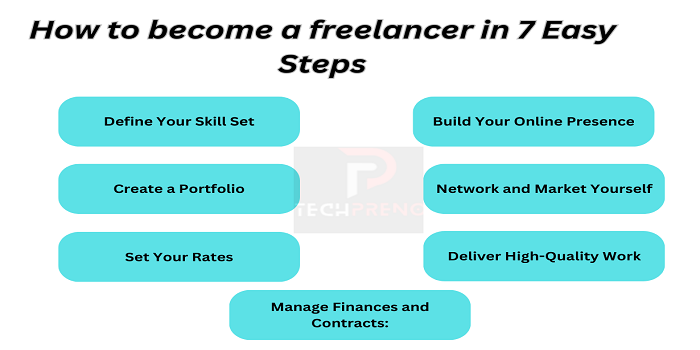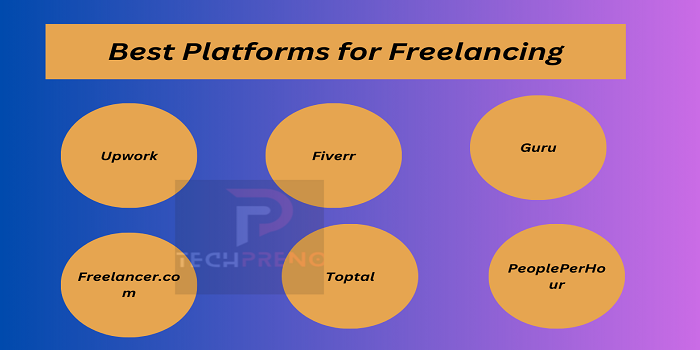Freelancing seems a lucrative career, it offers you total control of the driving seat. There are no restricted office timings, dress code issues and late arrivals. Instead, one works from the comfort of his own home.Consequently, experts are moving towards freelancing and making it their full-time career. However, what about those with little to no experience in this industry? How they can grab more clients and enjoy steady earnings by sitting inside their homes?This article will delve into everything you need to know about how to start your freelance career.
Table of contents
What is Freelancing
Freelancing is a type of job where an expert offers his services to another party\employer for a specific time. For instance, a content writing project that requires 4 blogs a week or a graphic designing task. Here the employee doesn’t have to visit any physical location like regular office goers do.
However, both parties connect through the internet and exchange information using specific applications. Experienced individuals often grab freelance projects to increase their incomes. While freshers struggle to land a client for months.

Therefore, we have brought this guide that explains how a beginner can kickstart his freelancing career.
How to become a freelancer in 7 Easy Steps
Whether you are a kick-ass freelancer or looking to become one. Following these 7 steps will help you to know more about how How to start your freelance career like a pro. Freelancing is a world of opportunities where you have the freedom to choose desired skill set and timings as well.
Here is a road map for you to follow and earn a steady income.

Define Your Skill Set
Freelancing is a path having different roads for an individual. In other words, freelancing offers you to adopt skills as per your passion and dedication. You can go for content writing, graphic designing, animation marketing, etc.
The first step towards becoming a freelance expert is to define your skill set. Regardless of what skill you opt for, make sure you spend time polishing it. Freelance seems a lucrative world yet it is competitive as well. A little negligence on your part can be a reason for losing a potential client.
Create a Portfolio
Once you’ve decided on your niche, it’s essential to build a portfolio that showcases your work. Include samples, projects, case studies, or testimonials that highlight your skills and capabilities. Your portfolio acts as a visual resume that potential clients can review to gauge your proficiency and style.
Set Your Rates:
Determine how much you will charge for your services. Research industry standards, consider your level of experience, and factor in the complexity of projects when setting your rates. It’s important to be competitive but also value your time and expertise appropriately.
Build Your Online Presence
Establish a strong online presence to attract clients. Create a professional website that showcases your portfolio, services, rates, and contact information. Additionally, create profiles on freelancing platforms like Upwork, Freelancer, Fiverr, or LinkedIn to expand your reach and connect with potential clients.
Network and Market Yourself
Networking is crucial for freelancers. Connect with other freelancers, industry professionals, and potential clients through social media platforms like LinkedIn, Twitter, or industry-specific forums and groups. Attend networking events, webinars, and workshops to build relationships and market your services effectively.
Deliver High-Quality Work
Once you start working with clients, prioritize delivering high-quality work consistently. Communicate effectively, meet deadlines, and exceed client expectations to build a positive reputation. Satisfied clients are more likely to provide repeat business and referrals, which are essential for freelancers.
Manage Finances and Contracts:
As a freelancer, it’s important to manage your finances effectively. Keep track of your income, expenses, invoices, and taxes. Use contracts for every project to outline project details, scope, deadlines, payment terms, and revisions. Contracts protect both you and your clients and ensure a clear understanding of expectations.
Best Platforms for Freelancing
When it comes to freelancing, several platforms stand out for their popularity, user base, and range of opportunities. Upwork is known for its diverse job categories and large client pool, making it ideal for freelancers in various fields. Freelancer.com offers a competitive marketplace with a wide range of projects, from small gigs to long-term contracts. Fiverr focuses on creative services and allows freelancers to showcase their skills through gig packages.

| Platform | Specialization | Job Categories | Client Base | Features |
| Upwork | Various | Wide range | Large and diverse | Project tracking, |
| client base | escrow protection | |||
| Freelancer.com | Competitive market | Diverse | Global | Contests, |
| project milestones | ||||
| Fiverr | Creative services | Gig packages | International | Gig portfolios, |
| clients | ratings | |||
| Toptal | Top-tier freelancers | Software, finance, | High-paying clients, | Screening process, |
| design | exclusive projects | talent matching | ||
| Guru | Diverse job board | Various | Global | Workrooms, |
| clients | project management | |||
| PeoplePerHour | Hourly, project-based | Multiple industries | International | Hourly rates, |
| clients | workstream |
Conclusion
Venturing into freelancing opens a world of opportunities where professionals can harness their skills, control their schedules, and build thriving careers on their terms. By following the seven essential steps outlined in this guide, beginners can navigate the freelance landscape with confidence and competence. By reading above guide it will be clear How to start your freelance career.
Defining your skillset, creating a compelling portfolio, setting competitive rates, establishing a robust online presence, networking strategically, delivering top-notch work consistently, and managing finances and contracts efficiently are the pillars that support a successful freelance journey.
Read More How to start your freelance career
FAQS
Freelancing offers flexibility in work hours, the freedom to choose projects, the potential for higher earnings, and the ability to work from anywhere.
Freelancers can maintain a strong online presence, network actively, deliver high-quality work, and ask for referrals from satisfied clients.
Freelancers should research industry standards, assess their skills and experience, consider project complexity, and factor in overhead costs and desired earnings.
Freelancers should track income and expenses, use accounting software or tools, save for taxes, invoice promptly, and use contracts for every project to ensure clarity and protection.

